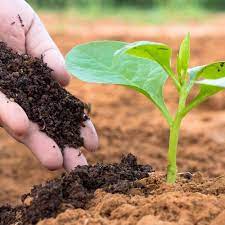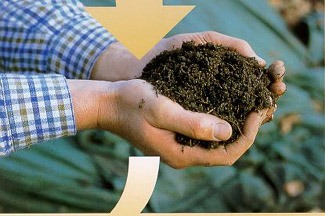Courtesy : www.ecepl.com
Organic composting
refers to a sequence of steps by which organic waste materials such as leaves, grass, fruits, vegetables, and others are acted upon by microorganisms in the presence of water and oxygen to produce humus. The humus is a product enriched with fiber and inorganic nutrients like phosphorus, potassium, and nitrogen. Humus is a natural fertilizer that is friendly to the environment. The composting process can vary depending on the method or equipment used. Apart from the natural method, composting can also be done with the aid of machine
Earth Care Equipment Pvt. Ltd has developed different types of equipment for the purpose of composting organic waste. The company is well known for the use of RTCT for commercial composting and Kwik Composter for small scale composting. The process used in each case varies.
There are three types of composting that are generally considered namely aerobic, anaerobic, and vermicomposting.
Composting methods
Composting needs vary from one person to another, and they also vary from time to time. This is what necessitates a matching variation in composting methods. It is advisable that one understands the advantages of composting with each different method so as to be able to choose the most appropriate composter. It is also worth noting that the effectiveness of each method varies.
Composting methods may be considered under the following descriptions:
Open air composting
This is a traditional method involving building a pile of green and brown organic waste in your backyard. It is sometimes referred to as hot composting due to the amount of heat that builds up with the pile of waste, especially when it is done on large scale. You may have to construct a bay or use bins to support the pilling of waste.
Direct composting
This method entails simply digging a hole or a trench in the ground in which organic waste can be buried. This is one of the oldest methods known to be effective in composting organic waste. Compared to other methods, the time taken by the waste to decompose is relatively long. However, the process can be faster if the organic waste materials can be chopped up into small pieces.
Tumbler composting
This involves the use of a tumbler unit to produce compost from organic waste. There are many different shapes and sizes of tumblers that can be bought from local hardware stores. The work of composting using this unit is labour intensive because you have to keep turning it daily or every few days. For long term composting, mechanized tumblers are recommended. It is also recommended that you use two units, so that you can alternate the decomposition process.
The method is good when you have large amounts of organic waste and you have enough space to fit the tumbler composting unit.
Worm farm composting
This is the most popular and preferred method of composting organic waste. This is mainly because it is capable of growing worms, producing compost and keeping rats and snakes out of the compost heap. The worms produce castings that are enriched with nutrients, though lower in nitrogen compared to what other methods produce.
The advantage with this method is that it can be used even without a garden, you just need to find any appropriate thing that you can afford. However, metal containers like copper leaches are not recommended because they are toxic to the worms. Foam containers may also not be good because worm juice would eat out the foam and the juice would leak everywhere. With plastic containers you can collect the juice, although you will need to fit a tap to drain it off.
The worms would need to be kept away from the sun, frost, and rain because they are temperamental and they can easily escape if the conditions are not right. It is recommended that you use worms that are local to the area, unless you are sure that worms from other areas can survive. Examples of worms that may be used in composting include Lumbricus rubellus, Eisenia fetida, pontoscolex corethrunus or pheretima group that is commonly found in gardens.
EMO composting
EMO is an abbreviation for Effective MicroOrganisms. This method is generally used for indoor composting. The most common product of this method is Bokashi system which aids the composting process. EMO can be purchased online and it can be used with other systems to facilitate the composting process.
Combination composting
This method is also referred to as Compot composting. It combines open air composting, direct composting, worm farm composting, and EMO composting. This combination makes the method flexible enough to suit most household circumstances. The method can be used to compost virtually all types of organic waste. This method is faster and requires less work compared to other composting methods.
Commercial composting
This method produces compost in long rows. The process entails turning organic waste every 3 to 4 days and the compost is generally ready in about 6 weeks. Apart from the organic waste, other composting materials include sand, ferrous sulphate or sulphate of ammonia. All the materials are mixed together.
Mechanical composting
This is an efficient method of composting organic waste. It uses electricity to create the required heat and to rotate the contents to produce semi-composted waste within a day. This method is suitable for restaurants, hotels, hospitals, schools and other large institutions.
Composting process in RTCT
The composting process used by Earth Care Equipments Pvt. Ltd with their Re-Engineered Traditional Composting Technology (RTCT) is a commercial composting process and it has five main stages basically described as follows:
1. Receiving of mixed municipal waste
In this case, the waste is considered mixed because it is in two categories namely organic waste and garden waste. The two categories of waste are received separately. Organic waste include such things as vegetables, fruits and fruit skins, paper, egg shells, meat and bread. Garden waste include such things as leaves, flowers, grass, weeds, tree bark, pruned branches, clippings and twigs.
2. Segregation
After receiving, the waste is then segregated. Waste segregation is the process of separating wet waste from dry waste. Wet wastes which mainly come from hotels and restaurants are usually heavy because of dampness. With the RTCT, the wet waste does not need segregation. Dry waste is manually segregated into recyclable material, organic waste, metals, and inert material.
3. Shredding and mixing
Both organic waste and garden waste can be shredded. Shredding refers to the act of tearing or cutting the municipal waste into small pieces. Shredding speeds up the process of composting because the smaller the pieces, the faster the microorganisms break down the waste in the compost bin. After shredding, the two categories of waste can then be mixed before composting.
4. Composting
This stage entails passing the mixed waste through the composting chamber of the RTCT. Composting is the process by which microorganisms break down the waste into its simplest components. The process is facilitated by the availability of water and oxygen in the mixture. This process produces compost, which is popularly used as a fertilizer.
Once the waste is properly composted, other important tasks include curing, maturation, and filtration. Curing refers to the act of slowing down the decomposition process. Also, stabilization and humification of the organic matter happens at this point. Maturation involves further removal of organic matter (pathogens) and other pollutants in the waste. Filtration on the other hand is the process of separating suspended solids from liquids in the waste. It involves the use of a suitable filter.
5. Selling
This is the stage at which compost is packaged for sale. Apart from the compost, other products of the composting process that can be sold include recyclable material, metals, and inert material.
Composting process with Kwik Composter
With a Kwik Composter from Earth Care Equipments Pvt. Ltd, the process of composting step by step usually proceeds as follows:
- Loading organic waste through inlet together with carbonaceous material and composting culture.
- Mixing, curing is automatically done by the machine
- Ready compost keeps collecting in the machine’s chamber or in a bag.
- Finally, the compost is removed as soon as the chamber is full.
Benefits of composting
Composting is a process that is associated with the following benefits:
- It enriches the soil by fixing valuable nitrogen.
- It helps the soil to retain moisture.
- It helps in suppressing plant diseases and pests.
- It reduces the use of chemical fertilizers.
- It encourages the production of beneficial bacteria and fungi that help in breaking down organic matter to create a rich nutrient-filled material called humus.
- It reduces the emission of methane gas from landfills and it helps in lowering our carbon footprint.
There is a significant number of composting methods available for you to use depending on your unique needs. Some are similar, some are same, some are more efficient, some work as a combination, and some are just different. The different methods cause differences in composting processes. They would better be represented in a composting process diagram. Nevertheless, composting remains the best thing you can do for your business, garden and environment.
Search
Our Products
Categories
- All23
- Uncategorized1





